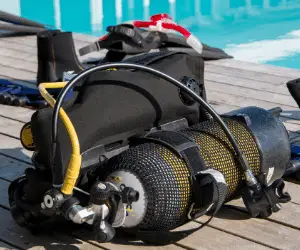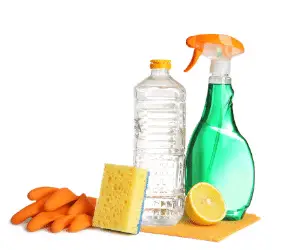Scuba diving gear doesn’t come cheap, and it is advisable to take good care of your scuba gear if you want to prolong its life. More importantly, gear maintenance is a crucial part of scuba diving that, when ignored, could have devastating consequences. It is one of the primary ways to ensure your safety once you’re submerged in water. Luckily, all you need is a few precautionary steps and a good rinse with a household liquid – vinegar.
What Happens If I Don’t Clean My Gear?
 Whether you are going freshwater diving or trying your scuba gear out in the ocean, water (especially salt water) can be corrosive to any type of gear. Ocean water, in particular, can lead to a buildup of sand and salt deposits in all the nooks and crannies of your gear. These are some of the consequences of not maintaining your gear:
Whether you are going freshwater diving or trying your scuba gear out in the ocean, water (especially salt water) can be corrosive to any type of gear. Ocean water, in particular, can lead to a buildup of sand and salt deposits in all the nooks and crannies of your gear. These are some of the consequences of not maintaining your gear:
- Salt buildup on your scuba mask makes it blurry. Consequently, this makes it difficult for you to see, which is critical when you’re underwater. Camera lenses are also prone to get blurred by salt buildup.
- Equipment malfunctions such as clogged breathing regulators are usually a result of unrinsed scuba gear. Buttons and latches are also easily clogged this way. You never want to find a clog when you’re too deep underwater to fix it or get out safely.
- Corrosion. Any metal object that is exposed to water for long enough is subject to corrosion, which is an oxidation-reduction reaction that changes metals to their natural ores. A typical example is iron rusting. Scuba gear these days uses minimal metals, but as some parts are inevitably metallic, they are subject to corrosion.
- Wet scuba gear can provide the perfect environment for mold and bacteria growth, which can be detrimental to your health if improperly cleaned before use.
How To Use Vinegar For Cleaning Scuba Gear?
 The general recommendation for using vinegar when cleaning scuba gear is to use saturated vinegar. It can do the job quicker because there is more vinegar than water in the solution. Any type of vinegar will do, but plain white vinegar is best.
The general recommendation for using vinegar when cleaning scuba gear is to use saturated vinegar. It can do the job quicker because there is more vinegar than water in the solution. Any type of vinegar will do, but plain white vinegar is best.
Many scuba divers rinse out all the equipment using a saturated vinegar solution (1:10) and then repeat the rinse with water. Freshwater rinses on site (when vinegar is unavailable) are not sufficient to dislodge salt and sand from all the nooks and crannies of your scuba gear.
If you’ve left your scuba gear to dry without giving it a rinse, a longer vinegar soak might be helpful. A large barrel with a 1:100 solution of vinegar and warm water is easy enough to mix up. After soaking for an hour, most of the sand and deposits will be easier to rinse away. Use a brush to clean any corrosion you see on the regulator or tough spots that need more attention. Use gentle pressure and avoid brushing vigorously. A clean toothbrush is a perfect tool for this, and it’s readily available at any drug store.
To ensure you’ve allowed the vinegar solution to penetrate the gear, move it around, press all the buttons, and latch/unlatch any parts. Those are the hardest areas to clean, and because the space is so narrow surrounding buttons, it is more subject to clogging with sand, salt, and other deposits from seawater.
After rinsing your gear with water, use a clean towel to dry most of the surface moisture and leave your scuba gear to air dry.
Precautions
- Avoid using undiluted (neat) vinegar; it may be too strong for some parts of your diving gear.
- Never use vinegar solutions rinse any cameras with optical coating as it may damage the coating.
- A thorough rinse with fresh, clean water is essential after using a vinegar solution to clean your scuba gear.
What Does The Vinegar Do?
Vinegar is a mild solvent known for its natural cleaning properties. It can be considered a detergent, so using it is much like using dish soap to clean your gear. However, vinegar is non-toxic, so you don’t have to worry about any fumes or leftover vinegar residue. It is also more volatile than water and thus dries out faster than water would.
Studies have shown that vinegar has some antimicrobial properties, making it useful in cleaning and disinfecting moldy surfaces on your scuba gear. While pure vinegar is corrosive, commercially available vinegar is usually sold as a water solution of vinegar. Nonetheless, the corrosive properties of acetic acid can help in cleaning scuba gear thoroughly. It can also rinse away any soap residue or scented oils left on your gear from previous cleanses if you’ve used a scented soap or other cleaning solvents.
Vinegar Substitutes And Reasons Not To Use Them
Some people do not like the smell of vinegar or think that it is not a strong enough cleaner. These are some substitutes that people have used to clean their scuba gear and reasons they’re unsuitable.
- Diluted bleach is very effective at disinfecting but not a good detergent. Also, bleach is highly corrosive to the skin, and using it may need extra protective measures. Fumes from bleach are hazardous and may cause breathing problems, especially for those with existing respiratory conditions.
- Antibacterial Dish Soap is the ultimate detergent, and it’s safe to use with minimal precautionary measures. However, most dish soaps are scented and may leave a film on your equipment. Any residues can build up over time, so avoid using dish soap on your scuba gear.
- Rubbing alcohol is a disinfectant and universal solvent. It’s detergent properties are equal to vinegar, and it is more volatile (thus dries faster). However, alcohol is more corrosive than vinegar and will definitely damage your equipment so avoid it at all costs. Most scuba diving gear manufacturers issue warnings against the use of alcohol (of any kind) to clean or rinse scuba diving equipment.
Cleaning your scuba gear with vinegar is relatively simple and cheap. Scuba diving is a bit costly because of the equipment and maintaining them is very important. Also, vinegar is a natural product and poses a negligible risk to people who use it for cleaning purposes.
